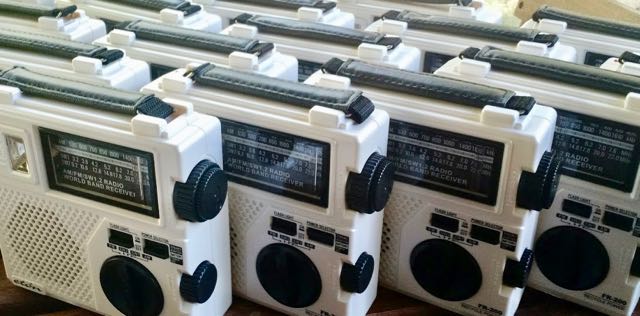Many thanks to SWLing Post contributor, Tracy Wood, who writes:
I accidentally ran across this Brazilian government press agency release … In Spanish, then I found an English version.
Somewhat dated as the floods were back in May.
Thank you, Tracy. This article didn’t come to our attention in May, so we appreciate the link!


Brazil’s Government broadcaster EBC has been transmitting using high power high frequency (SW) to the Amazon. They have extensively tested Digital Radio Mondiale to the point where they were about to contract the construction of a high power DRM transmitter. Then there has been changes of Government. The low power tests were even heard in the USA.
DRM’s Emergency Warning Functionality can wake the radio, sound a siren, make a loud announcement and display text instructions. If the receiver has a larger screen it can show maps and extensive indexed instructions in multiple languages. Thus there can be different instructions for different areas available simultaneously. The big advantage is that they can be broadcast from a site nowhere near the emergency.
https://youtu.be/Tua6xKalgZ0
This module is so low power it can be solar or hand cranked generator.
Yes, the DRM tests were conducted using RN da Amazonia transmitters. Now they’re back on air in AM and DRM has been cancelled. One may wonder what was the result of these tests? My guess is that they noticed the simple fact there are no DRM receivers which are easily available, so using DRM would defeat the main purpose of having an emergency warning system. What’s the point of transmitting emergency programmes if no one can receive them? Especially if we consider that no station is known to actually use the emergency warning capabilities of DRM. It’s a solution in search of a problem, we can see on the example of Brazil that the best system for emergencies is the one that they have since decades, that is analogue shortwave AM. No need to break what’s not broken.
“https://youtu.be/Tua6xKalgZ0 – This module is so low power it can be solar or hand cranked generator.”
Too late. This module should have been available 15 years ago.
The comment about Spanish – vs – Portuguese is not really what it seems. It seems the Brazilian government press agency actually wrote distinct articles in ** three ** languages. I indeed initially observed the Spanish version. Here are all three:
PORTUGUESE:
https://agenciabrasil.ebc.com.br/geral/noticia/2024-05/radio-nacional-chega-onde-falta-energia-e-ajuda-populacao-do-rs
SPANISH:
https://agenciabrasil.ebc.com.br/es/geral/noticia/2024-05/en-el-sur-la-radio-nacional-llega-adonde-no-hay-electricidad
ENGLISH:
https://agenciabrasil.ebc.com.br/en/geral/noticia/2024-05/public-radio-reaches-power-deprived-areas-brazils-south
EBC is the national broadcaster in Brazil. In the old days, Brazilian international radio even had a broadcast in German – surprised no German version appeared as that Rio Grande do Sul has many people of German background.
Yes, of course they speak Portuguese in Brazil. Read on…
Original Portuguese version:
https://agenciabrasil.ebc.com.br/geral/noticia/2024-05/radio-nacional-chega-onde-falta-energia-e-ajuda-populacao-do-rs
Spanish Version:
https://agenciabrasil.ebc.com.br/es/geral/noticia/2024-05/en-el-sur-la-radio-nacional-llega-adonde-no-hay-electricidad
There were ** three ** versions of the article.
Yes, the state press agency generated at least three versions of the article.
Thank you Tracy for pointing out this article. Shortwave still has its uses, and broadcasters like REE have other good reasons to invest in new transmitters. Cf. https://swling.com/blog/2024/06/rtve-approves-additional-shortwave-transmitter-and-secures-the-future-of-the-public-shortwave-service/
I’d just like to make two comments:
1 – First, this sentence contains an error: “Unlike AM and FM radios, which use longer waves, shortwave radios use waves that can reflect off the ionosphere, the electrified layer of the Earth’s atmosphere”. AM (Editor’s note: which here means Medium Wave, or perhaps also Long Wave) does use longer waves than CW, but FM uses much shorter waves, as we all know.
2 – Using batteries! Batteries run down over time and are worn out by the time the user needs them! Today, the vast majority of emergency radios are fitted with batteries (increasingly Ion-Lithium 18 650) that can be recharged via the mains, a hand-cranked dynamo or small solar panels. See, for example, the article on the D-608WB – Cf. https://swling.com/blog/2024/06/xhdata-weather-radio-d-608wb/ – or the one on the CCrane (which nevertheless has a battery compartment) – Cf. https://swling.com/blog/2024/06/checking-out-the-ccradio-solarbt/
What do you think?
Thank you for sharing Tracy!
Nothing beats radio frequency broadcasts in emergencies
Interesting radio – good contract for Eton / Grundig
By the way Brazil uses a form of Portuguese – but Spanish speakers should be able to read and understand it….
73
Julian